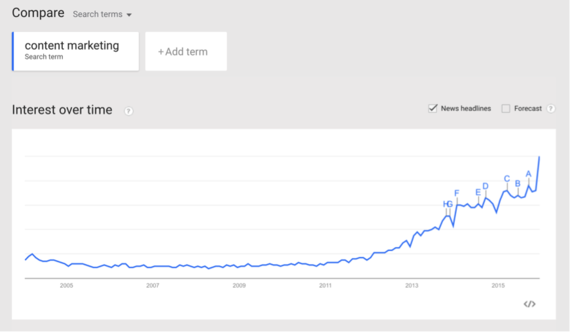Though widely debated when its birth actually was, marketing has existed for hundreds, if not thousands of years. Peculiarly it was only recognised as a business discipline as recently as 1884, with the first recorded mention in the OED. Either way, depending how you decide to view it, scratch away a little at the surface and you'll find an ecosystem of rules, trends and status quo; that can often, technology permitting, be attributed widely from company to company, culture to culture across the world. Marketing is a science, and as with the scientific disciplines you have proven ways of doing things, and other perhaps more experimental ways of achieving your objectives.
As such, the exact interpretation of the right way of doing things is open for negotiation. Unfortunately, this creates the ability for some individuals to pitch themselves as experts, when they actually fall quite short of the mark. This is especially true in newer inter-marketing disciplines.
Marketing Can Be Ubiquitous
Marketing is also ubiquitous. Though difficult to pin-point exact employment figures due to its varying position in today's business make-up, a recorded 3% of the UK's total workforce works in marketing related roles. It is also incredibly profitable, and growing in popularity and financial clout. As you'll see in the graphic below, while not represented in its own right, it is intertwined in some of the most profitable industries, if not only communications then its arguably heavily involved with technology services and electronic technology.
More so, marketing is required by almost all identified profitable verticals, and thus by its very nature sits comfortably across numerous industries, from country to country across the world. Needless to say, Content Marketing is now big business with PQ media forecasting $313 billion in revenue in 2019.
Interestingly, marketing is no longer just reserved for large organisations. This explosion in marketing fuelled by advances in technology has lead to increasing amounts of specialisms and disciplines. Where one time some 10-15 years ago any given small to medium size business would have 'a marketing guy' (or girl) accountable for all of their marketing activity, they are now far more likely to have several staff involved in their marketing practices and they may even employ an agency or consultant on top of this to help reap the rewards of their marketing endeavours.
Content, Digital, Social - It's All Just Marketing
Unsurprisingly, the web has vastly changed how marketing exists in todays society and, in turn, has monumentally effected the decision-making process at the C-level. Marketing is no longer reserved for only big businesses. In fact, quite the opposite, you're arguably more likely to encounter a small to medium business taking great inroads into their marketing activities than bigger businesses. Such that companies nowadays live and die by their digital marketing strategies, or in fact are born and become astronomically successful off the back of a well developed and executed strategy.
Along this vein, content and content marketing (which I'll use interchangeably in this post, as I believe them to be the same thing), though only coming to the forefront of marketing buzzwords in recent years has been the lifeblood of marketing strategies for over a century now. Take the launch of customer magazine The Furrow from John Deere in 1895 or the Michelin Guide developed by Michelin in 1900 to help drivers maintain their cars, and its easy to see that there's nothing new about content marketing.
Source: http://www.elitetraveler.com
"Content Marketing" Search term popularity from 2004-present according to Google Trends
Content Marketing Renaissance
When executed properly content exists in a fully integrated, planned and positioned way such that it is both relevant and contextual to its audience, your customers, clients or potential leads. It gives your company a voice and reinforces the ways in which you chose to do business, whether you're a local car wash using Facebook and Twitter to communicate latest time-sensitive offers, or sitting at the helm of a new creative and quirky multi-million pound ad campaign for Durex; developing content helps grow your business.
It has become very commonplace to see companies increasing their focus on content moving forward, reinforced by 76% of marketers stating that they will produce more content in 2016 compared to 2015.
A similar trend can be seen with the push to popularity of the mobilisation of the web that has been gradually developing pace over the last decade. It's similarly now commonplace for companies to prioritise mobile-friendly websites given that mobile searches worldwide had overtaken desktop. Content weaves itself through many aspects of doing business and pulls from all sides of the business, from the shop floor right up to the executive suite.
Source: http://contentmarketinginstitute.com/
Once businesses begin truly attributing value to content, as they likely do to other marketing disciplines, then they join the realms of businesses that we're discussing here. Only then can these organisations take social and other inbound marketing tactics seriously. It's got a purpose and its got a mission. Such that marketing is content marketing and content marketing is marketing.
Appreciating those organisations that embrace content truly, we can witness that content marketing is now it its Renaissance, and exists as a fundamental part of marketing strategies worldwide. Such that it is no longer a bit-part of the equation, but a fundamental part of doing business, marketing your company and existing in todays marketing-friendly society.
This Renaissance has, in my opinion, had an adverse effect on a number of marketing disciplines and especially such on how companies view and approach content. The problem is not with marketing in general, after all some strategies prove returns that deem them successful, others may fail to adapt and conclude otherwise. The problem here is the approach.
Marketing has, perhaps by burgeoning start-up scene, become a check-box exercise for many companies. The pressures from a potential IPO or increase in shareholder value means that many organisations are poorly strategising when it comes to content or simply retrofitting approaches made successfully by others in blind hope that it too will reap the same results.
And in operating in this way we have, through no direct means of our own, developed a generation of fake content marketers.
Fake Content Marketers
These fake content marketers are fully aware of 'best in class' examples of content application on a wider scale. They are widely read in the various facets of content marketing and how it integrates within their company on a whole. But, crucially, they lack the focus and command over a strategy that is truly integrated with the procedures of the company as a whole.
The worrying trend here is that these overly read, poorly equipped and inexperienced individuals are becoming increasingly commonplace. They are preachers of the virtues of content marketing not practitioners themselves.
It is safe to assume that many of you reading this will have in mind an example of 'fakes' in your industry, whether publically visible or not. This is now no different than with content marketing.
We all know people who preach about the virtue of content marketing and the importance of a calendar and keyword list yet, have never produced a valuable piece on content in their own right. While the rise in focus on content-driven marketing strategies moving into 2016, I fear that this is a worrying trend that if not addressed stands to damage the industry and content's role in marketing on a whole.


